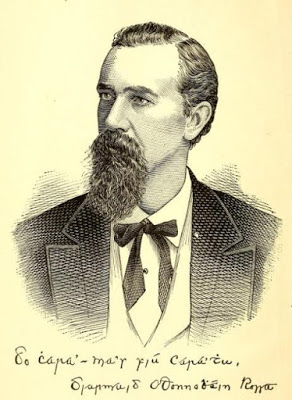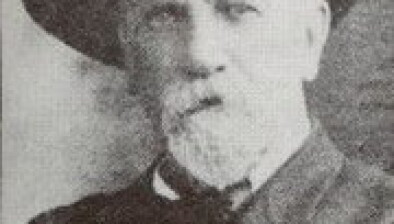Irish Legal Heritage: Jerimiah O’Donovan Rossa (Part II)

Sketch of O’Donovan Rossa from
Irish Rebels in English Prisons:
A Record of Prison Life (1899)
Upon merging with the Irish Republican Brotherhood, members of the Phoenix Society were trained in the use of rifles and military tactics by Irish-American officers of the Fenian Brotherhood (Shane Kenna, Jerimiah O’Donovan Rossa: Unrepentant Fenian (Merrion Press, 2015)).
This brought Jerimiah and the Phoenix Society to the attention of the Royal Irish Constabulary (RIC), and led to the Jerimiah’s first spell in prison along with a number of local nationalists who were “cheered and applauded by spectators” as they were escorted through the townlands of West Cork to Bandon barracks in December 1858:
“We were huddled into the cells flooded with water at nine o’clock in the evening having been travelling all day under rain, and having neither food nor drink, and now we wouldn’t get a bed nor bread. Next morning we found ourselves in Cork Jail, awaiting evidence on a charge of conspiracy” (Jerimiah O’Donovan Rossa, O’Donovan Rossa’s Prison Life: Six Years in Six English Prisons (1874)).
The men weren’t charged for a number of weeks, and six of them were held without trial until July 1859. The charges were based on witness testimony from an informant who swore he saw Jerimiah drilling three hundred men in Skibbereen; however, Jerimiah said the drillings did not take place and refused to plead guilty. Jerimiah and his men continued to plead their innocence; however, it was not until the Government offered to release Daniel O’Sullivan, a member of the Phoenix Society who had been sentenced to ten years imprisonment, that they agreed to plead guilty:
“It is not easy to get the better of your enemy when he has you under lock and key. The English law presumes that every man is innocent until he is proven guilty; but in political cases in Ireland the practice is quite the contrary, for every man is treated as guilty until he proves himself innocent” (Jerimiah O’Donovan Rossa, O’Donovan Rossa’s Prison Life: Six Years in Six English Prisons (1874)).
Released from Cork Jail to financial ruin after “landlordism played some pranks” with his family, Jerimiah states that the following six years at liberty were so “full of incident and adventure to make a book in itself”. During the eight months of Jeramiah’s first imprisonment, his wife, Nora, and their four children had been evicted from the family home and business premises in Skibbereen. In 1859, Nora died tragically from an illness which remains unknown, but was presumed to have been “brought on by the stress of her husband’s imprisonment” (Shane Kenna, Jerimiah O’Donovan Rossa: Unrepentant Fenian (Merrion Press, 2015)).
Róise Connolly









